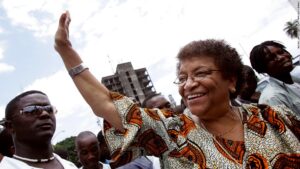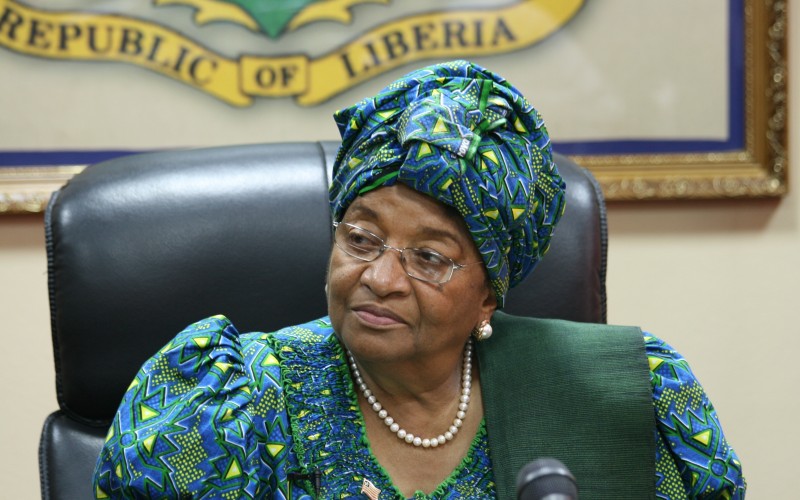Ellen Johnson Sirleaf is a name that is synonymous with resilience, courage, and leadership. She is a trailblazer who made history by becoming Liberia’s first female president and Africa’s first female head of state.
Her journey to the presidency was not easy, but it was a testament to her tenacity and unwavering commitment to her country.
Ellen Johnson Sirleaf’s election as the first female head of state in Africa was a ground breaking achievement that inspired many women across the continent.
Her victory in Liberia’s presidential elections in 2005 shattered the glass ceiling and opened up new opportunities for women to take on leadership roles in politics and other fields.
As a staunch advocate for women’s rights, Ellen Johnson Sirleaf worked tirelessly to promote gender equality and empower women in Liberia and beyond.
Her efforts, along with those of Leymah Gbowee and Tawakkul Karmān, were recognized by the Nobel Committee, which awarded them the 2011 Nobel Peace Prize.
This prestigious award was a testament to Ellen Johnson Sirleaf’s leadership and her unwavering commitment to promoting peace and social justice. It was also a recognition of women’s critical role in building peaceful and prosperous societies.
Ellen Johnson Sirleaf’s legacy as a champion for women’s rights is a powerful inspiration for women everywhere. Her dedication to promoting gender equality and empowering women to take on leadership roles has paved the way for future generations of women to achieve their full potential.
She has shown that women can be strong, effective leaders, and that their voices and perspectives are essential to creating a better world for all.
Early Life and Career
Ellen Johnson Sirleaf was born in Monrovia, Liberia, on October 29, 1938. She was the daughter of a Gola father and Kru-German mother.
She spent her early years in Liberia before moving to the United States to further her education. She earned a bachelor’s degree in economics from the University of Colorado, Boulder, and a master’s degree in public administration from Harvard University.
After completing her studies, Ellen Johnson Sirleaf returned to Liberia, where she worked in various government positions. She served as the Minister of Finance and later as the Minister of State for Finance and Economic Planning. She was also the Vice President of Citibank in the West African Region.
Ellen Johnson Sirleaf’s heritage is diverse, with a mix of Gola and German ancestry. Her father was a trailblazer in Liberian politics, becoming the first indigenous Liberian to sit in the national legislature.
Also read: List of the Past Presidents of Nigeria From Independence Till Date
Johnson Sirleaf received her early education at the prestigious College of West Africa in Monrovia, Liberia’s capital city.
She married James Sirleaf at the age of 17, but the couple later divorced. In 1961, Johnson Sirleaf moved to the United States to pursue further education in economics and business administration.
She obtained a master’s degree in public administration from Harvard University in 1971 and returned to Liberia to serve in various government positions.
Over the course of her career, Johnson Sirleaf demonstrated a strong commitment to financial integrity and accountability, earning a reputation for personal financial probity.
She served as the assistant minister of finance from 1972 to 1973 under President William Tolbert and as finance minister from 1980 to 1985 in Samuel K. Doe’s military dictatorship.
Despite her reputation for honesty, Johnson Sirleaf clashed with both heads of state and found herself in conflict with the government.
Ellen Johnson Sirleaf on Exile
During Samuel K. Doe’s regime, Johnson Sirleaf was imprisoned twice and narrowly avoided execution. Her outspoken criticism of the military government and campaign for a seat in the Senate during the 1985 national election led to her arrest and a 10-year prison sentence.
However, she was released after a short time and allowed to leave the country, eventually returning to Liberia years later to run for president.
After spending 12 years in exile in Kenya and the United States, Ellen Johnson Sirleaf became an influential economist for several international financial institutions, including the World Bank and Citibank.
She also served as the director of the Regional Bureau for Africa of the United Nations Development Programme from 1992 to 1997.
During this time, Liberia was plunged into a brutal civil war. In 1997, Johnson Sirleaf returned to Liberia and ran for president as a member of the Unity Party (UP).
Despite finishing second to Charles Taylor in the election, Johnson Sirleaf’s criticism of the Taylor regime led to her being charged with treason and forced back into exile. The civil war in Liberia resumed in 1999.
When Charles Taylor went into exile in 2003, Johnson Sirleaf returned to Liberia and was appointed to chair the Commission on Good Governance, which was responsible for overseeing preparations for democratic elections.
In 2005, she again ran for president, with a platform focused on ending civil strife and corruption, promoting unity, and rebuilding the country’s infrastructure.
Johnson Sirleaf earned the nickname “Iron Lady” for her determined and uncompromising leadership style. She finished second in the first round of voting, but went on to win the runoff election on November 8, 2005, defeating George Weah, a well-known football (soccer) player.
Ellen Johnson Sirleaf was inaugurated as the president of Liberia on January 16, 2006, becoming the first female head of state in Africa.
Her victory was celebrated as a historic moment for Liberia and the continent as a whole, and she immediately set to work on implementing her ambitious agenda for reform and rebuilding.
Her election was historic not only because she was the first female president but also because it marked the end of Liberia’s 14-year civil war.
Johnson Sirleaf’s leadership helped to restore stability and growth to Liberia, and she was ultimately recognized with a Nobel Peace Prize in 2011 for her efforts to promote women’s rights and peace in the country.
Presidency
Ellen Johnson Sirleaf’s presidency was marked by significant achievements. She worked tirelessly to rebuild the country’s infrastructure and economy, which had been devastated by years of civil war. She also prioritized education, healthcare, and gender equality.
One of her most significant accomplishments was the cancellation of Liberia’s debt, which had accumulated over many years.
She also improved the country’s relations with other nations, particularly the United States, which had imposed sanctions on Liberia during the civil war.
In 2010, Johnson Sirleaf announced that she would seek a second term as president, despite having previously pledged to serve only one term.
She cited unfinished work as the reason for her decision. However, a small opposition group challenged her eligibility to run in the October 2011 presidential election, arguing that the constitution required all presidential candidates to have resided in Liberia for 10 years prior to the election.

Johnson Sirleaf and several other candidates did not meet this requirement, which the government had attempted to change through a failed referendum in August 2011.
With just six days before the election, the Supreme Court dismissed the challenge, recognizing that the years of conflict had forced many Liberians to live outside the country, a circumstance the drafters of the 1986 constitution could not have foreseen.
Nonetheless, Johnson Sirleaf’s eligibility remained a contentious issue leading up to the election. The controversy was further amplified when the Nobel Committee announced that Johnson Sirleaf, along with two other women, would receive the 2011 Nobel Peace Prize for their work in promoting women’s rights.
Some candidates and opposition groups accused the Nobel Committee of interfering in Liberian politics by awarding the prize so close to the election.
Ellen Johnson Sirleaf’s leadership during the Ebola crisis was also commendable. She acted swiftly and decisively, putting measures in place to contain the spread of the virus. Her efforts were recognized globally, and she was awarded the Nobel Peace Prize in 2011 for her role in promoting peace and democracy in Liberia.
Following her two-term presidency, Johnson Sirleaf was constitutionally required to step down after the 2017 presidential election. Her running mate and vice president, Joseph Boakai, became the presidential candidate of the Unity Party (UP).
However, after the first round of voting, Johnson Sirleaf was accused by the UP of supporting George Weah, her previous opponent.
She denied the accusations, but they persisted, leading to her expulsion from the UP in January 2018. On January 22, 2018, Johnson Sirleaf stepped down as president of Liberia and handed power to Weah, who had won the second round of voting.
This transfer of power was a significant milestone for Liberia, as it marked the first time since 1944 that the country had democratically elected leaders peacefully hand over power to one another.
Throughout her presidency and even after stepping down, Johnson Sirleaf remained an influential figure in Liberian politics and continued to advocate for women’s rights and good governance in Africa.
Legacy
Ellen Johnson Sirleaf’s legacy is that of a trailblazer, who paved the way for women in Liberia and Africa to assume leadership positions.
She inspired generations of women to follow in her footsteps, and her commitment to democracy, peace, and development in Liberia has left an indelible mark on the country’s history.
Her leadership during the Ebola crisis also demonstrated her ability to handle crises effectively, and her advocacy for gender equality has set an example for future leaders to follow.
In conclusion, Ellen Johnson Sirleaf’s story is one of resilience, courage, and leadership. She overcame many obstacles to become Liberia’s first female president, and her achievements and legacy continue to inspire many.
Her commitment to democracy, peace, and development in Liberia has left an indelible mark on the country’s history, and her leadership has set an example for future leaders to follow.

